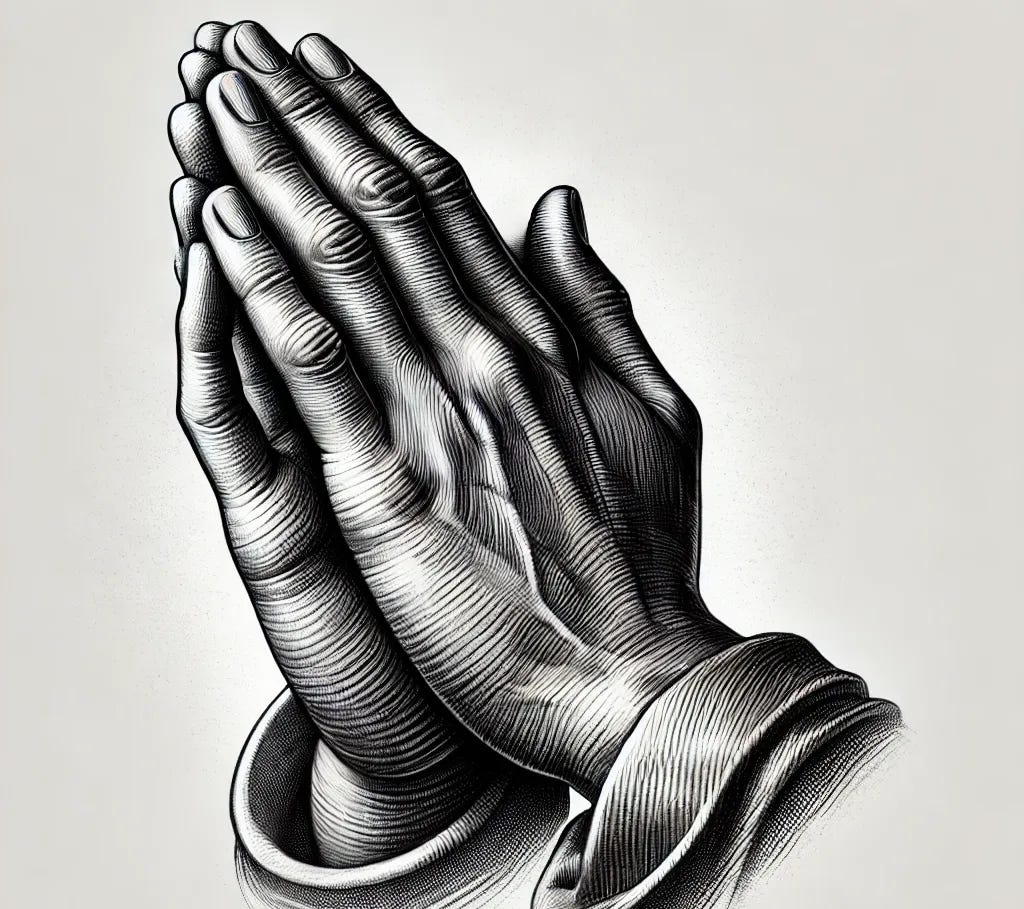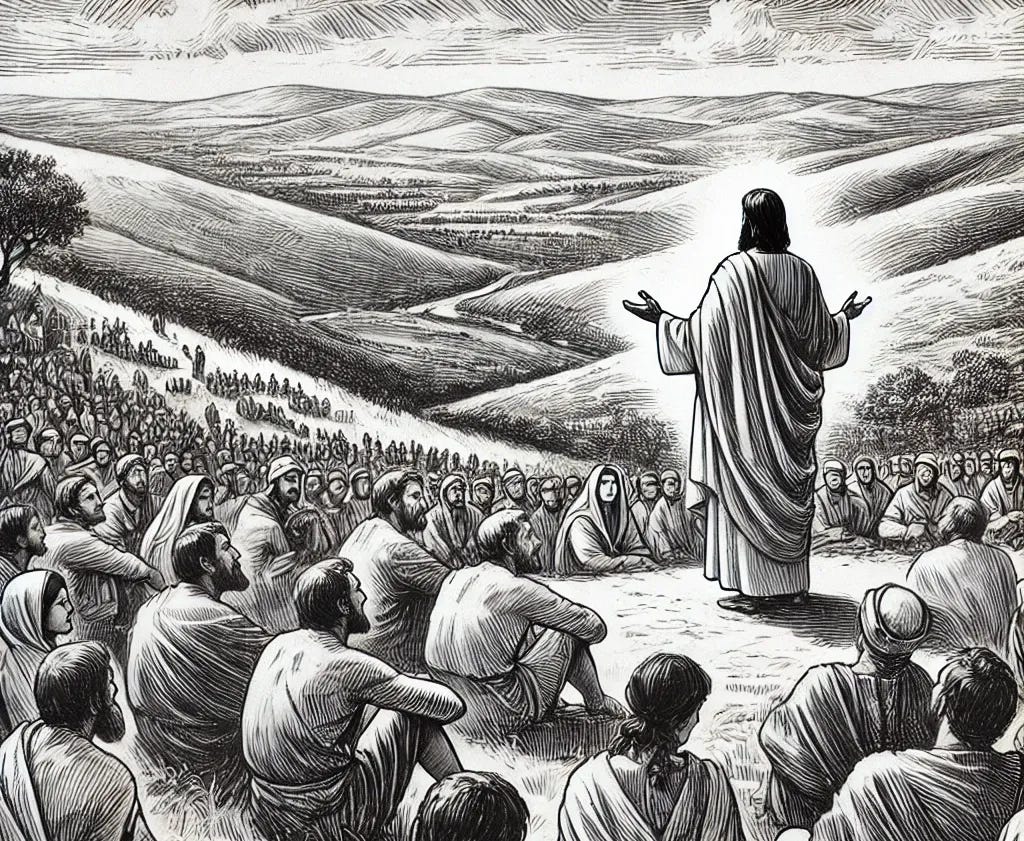Born into the Christian faith and traditionally baptized, I have always remained open to exploring other philosophies and practices, such as Zen meditation and yoga. However, Christian prayers—particularly the Lord’s Prayer—will always be at the heart of my spiritual practice.
I recite the Lord’s Prayer every day, usually at the beginning of my meditation sessions. In this article, I would like to share my interpretation of it and explain why it holds such deep meaning for me.
But before we dive into that, let me briefly introduce the background of this beautiful prayer.
Background
The Lord’s Prayer, also known as the Our Father (Latin: Pater Noster or Oratio Dominica), is the prayer that Jesus taught his followers, as recorded in the New Testament (NT). It is one of the most well-known passages in the Bible and a cornerstone of Christian faith. Along with the Ten Commandments and the Creed, it is considered essential knowledge for Christians and is recited across all Christian denominations.
The NT preserves two versions of the Lord’s Prayer: one in the Gospel of Matthew and another in the Gospel of Luke. The version in Matthew appears in the middle of the Sermon on the Mount, a key section of Jesus’ teachings that precedes his acts of salvation. In this context, Jesus instructs his followers on how to pray, emphasizing sincerity and humility in contrast to the public, overly elaborate prayers of the Pharisees and non-Jews.
Personally, I have learned and I practice the Matthew version, which is why I will use it as the basis for my discussion.
The Lord’s prayer according to Matthew
“Our Father in heaven, hallowed be your name. Your kingdom come, your will be done, on earth as it is in heaven. Give us this day our daily bread, and forgive us our debts, as we also have forgiven our debtors. And lead us not into temptation, but deliver us from evil.” Matthew 6:9–13 ESV.
My line by line interpretation
Now, let’s go through the prayer line by line, where I will share my interpretations and the questions it raises for me:
Our Father in heaven:
Jesus addresses God as “our Father”, emphasizing that we are all His children. Notably, Jesus does not distinguish between himself and us, reinforcing my belief that we all have the potential to grow spiritually and become more like Jesus ourselves.
God the Father is described as being “in heaven”, which raises an important question for me: if God is omnipresent, why is He specifically mentioned as being in heaven and not everywhere? My interpretation is that heaven is not necessarily a physical place but rather a state of divine bliss.
One might also ask why God is referred to as our Father rather than our Mother. This is a fascinating question, but I will leave it for another discussion at a later time.
Hallowed be your name:
Does God need us to hallow His name? Certainly not. But in my view, praising the Lord transforms us, elevating our own energy and spiritual state. Conversely, speaking negatively about God does not diminish Him—it only harms us.
Your kingdom come:
There are many rulers on earth, whether political leaders or corporate executives, but none of them can ever be a perfectly just “king”. Only God can lead us to true peace, love, and enlightenment. That’s why we should pray for His kingdom to come—not only in the world but also within our hearts, where it can take root and transform us from within.
Your will be done, on earth as it is in heaven:
To me, this is the most powerful statement in the entire prayer. We are small—so small that we cannot see what is ultimately best for ourselves or others. That is why we should surrender and pray: Not my will, but Your will be done!
Give us this day our daily bread:
Notice that we ask God for bread—symbolizing our daily necessities—not for wealth or luxury. And it reminds us to be grateful for receiving what we truly need in the present moment, not in the future.
For me, this is perhaps the most challenging part of the Lord’s prayer, as I seek security for myself and my family—yet it calls us to place our trust in God.
Forgive us our debts, as we also have forgiven our debtors:
These are truly wise words. I have learned the hard way that true happiness is only possible when we forgive others—only then can we experience true freedom. In this sense, forgiveness can even be seen as a selfish act!
The same applies to ourselves. We must recognize that as humans, we are imperfect and constantly learning from our mistakes. That’s why we are worthy of our own forgiveness.
I firmly believe that when we forgive others and ourselves, God will also forgive us.
Lead us not into temptation, but deliver us from evil:
When we pray, “Deliver us from evil,” we are acknowledging that the power of evil is too great for us to handle alone, without the help of God. When we witness war, injustice or disease, Jesus instructs us to pray, “Deliver us from evil.” We call upon our Father to step in—to do for us what we cannot do for ourselves.
Why I love it so much
I hope I have been able to convey why this prayer means so much to me. When truly embraced, it serves as a powerful guide to a fulfilling life—on earth as it is in heaven!
Want to engage?
Please subscribe and join my community, if you would like to engage in deeper discussions about this or any topic related to healing and awakening. My paid subscribers have access to personal coaching via Chat, and Gold Members get one hour of personal coaching via Teams/Zoom per year on top.
I also offer personalized coaching sessions on spiritual topics and powerful techniques that have helped me and many others before—let them be a resource for you as well on your path of healing and awakening. Just reach out!






